The views expressed in our content reflect individual perspectives and do not represent the authoritative views of the Baha'i Faith.
One of the deepest modern thinkers, the psychologist and Harvard professor Steven Pinker, says “today we may be living in the most peaceable era in our species’ existence.”
That startling claim, made on the first page of Pinker’s landmark book The Better Angels of Our Nature: Why Violence has Declined—may surprise you. We certainly have plenty of evidence for the exact opposite conclusion, including six thousand recorded years of violent human history. Human beings have perpetrated all kinds of violence–self-directed, interpersonal and collective—which has hurt our species since its beginnings. Wars and their horrible consequences only serve to further indicate that the human species has naturally violent inclinations.
However, Pinker and many other scientists cite an expanding consensus that humanity possesses a wealth of multiple natural mechanisms for cooperation and peacefulness. Over time, we have developed civilizing strategies to keep conflict in check, to channel aggression, and to overcome violent tendencies. A growing body of evidence proves that these peaceable behaviors come just as naturally to us as the aggressive, violent tendencies.
Everyone who has raised a child already knows this basic fact. We are both violent and peaceful beings, with twin light and dark tendencies that can lead us toward either path. Everyone has the potential for peace, just as everyone has some possible physical violence inside themselves.
Which of those paths seems like the right one to you? For Baha’is, the path of peace far excels the path of violence and aggression:
A Baha’i denies no religion; he accepts the Truth in all, and would die to uphold it. He loves all men as his brothers, of whatever class, of whatever race or nationality, of whatever creed or colour, whether good or bad, rich or poor, beautiful or hideous. He commits no violence; if he is struck he does not return the blow. – Abdu’l-Baha, Abdu’l-Baha in London, p. 56.
“He does not return the blow”—that simple but not-so-easy to accomplish idea of turning the other cheek may sound familiar to you if you’re a Christian, because Christ commanded his disciples not to return the blow. But nonviolence and peaceableness aren’t just Christian principles—you can find the concept of nonviolence in the original teachings of all of the great world religions. Gandhi recognized its roots in Hinduism; Buddhists like the Dalai Lama practice nonviolence daily; and the Baha’is emphasize and practice nonviolence in their dealings with all of humanity:
Know thou, verily, the Sun of Truth hath shone forth with the lights of peace upon all regions. Strife and conflict will surely be removed from all the nations of the earth. Carnage shall be taken away; fighting, violence and reviling will be changed into universal reconciliation and the hosts of tranquility will pitch their tents in the midst of the world. Then the awning of the mercy of thy Lord will be hoisted and those souls who are free from the filth of prejudice, contradictions and presumption and are filled with a love that imparts affinity, intimacy, affection, meekness and humbleness will be sheltered under it. – Abdu’l-Baha, Tablets of Abdu’l-Baha, Volume 2, p. 424.
So what do we do with our violent impulses? If faith teaches us peace, but we feel like lashing out, how do we reconcile those two conflicting instincts?
Almost every person, at some point in life, feels the need to react violently, to strike out against an aggressor, to meet violence with equally violent resistance. Anyone who has ever been bullied or mistreated as a child knows the feeling. When we’re hurt, we want to get even. We naturally want to inflict the same pain on others that they have inflicted on us, and we store up the anger and the impulse for righteous vengeance that injustice imposes on us.
But when this happens, the pain of violence causes more violence, and the cycle continues. The Baha’i teachings call for an end to violence in the world:
Sanctify your ears from the idle talk of them that are the symbols of denial and the exponents of violence and anger. – Baha’u’llah, Gleanings from the Writings of Baha’u’llah, p. 72.
O ye lovers of God! In this, the cycle of Almighty God, violence and force, constraint and oppression, are one and all condemned. – Abdu’l-Baha, Selections from the Writings of Abdu’l-Baha, p. 149.
So what will stop violence? The only way to stop it, the great peacemakers like Gandhi argued, is to respond peacefully to it. The Baha’i teachings emphasize that approach. Abdu’l-Baha advises us to transmit our feelings of vengeance into qualities that lead to peace:
Now, vengeance is reprehensible even according to reason, for it is of no benefit to the avenger. If a man strikes another, and the victim chooses to exact revenge by returning the blow, what advantage will he gain? Will this be a balm to his wound or a remedy for his pain? No, God forbid! In truth the two actions are the same: Both are injuries; the only difference is that one preceded the other. Therefore, if the victim forgives, or better still, if he acts in the opposite manner, this is praiseworthy.
As for the body politic, it punishes the aggressor but not to exact revenge. The purpose of this punishment, rather, is to deter and dissuade, and to oppose iniquity and aggression, so as to prevent others from extending their hand likewise in oppression. But if the victim chooses to forgive and to show instead the greatest mercy, this is most approved in the sight of God. – Abdu’l-Baha, Some Answered Questions, newly revised edition, pp. 307-308..
This kind of peaceful response to violence and aggression is very difficult. To instantly forgive someone who intentionally harms you, to see that person as a spiritual being, and to try and understand the root of their aggression and anger means purifying the heart and soul with a consciousness of universal love for others. But that’s the challenge the Baha’i teachings present to us—to truly remove all violent tendencies from our inner characters.
You May Also Like
Comments








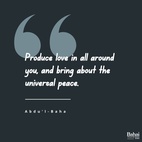
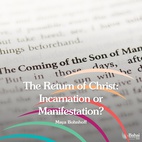
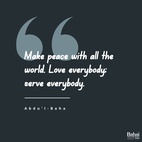
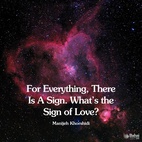


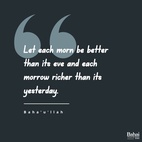


ending the cycle of hatred.
I think that will be enough, won't it?”
― Jiddu Krishnamurti